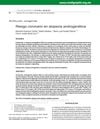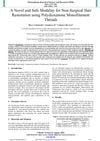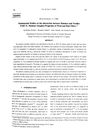Search
for
Sort by
Research
510-540 / 1000+ resultsresearch Open Questions in Hidradenitis Suppurativa Research: A Hair Biologist's Perspective
The conclusion suggests that early signs of hidradenitis suppurativa may start in the hair follicle, with genetic and immune factors playing a role, highlighting the need for more research on the hair follicle's immune system.

research Multiple Flat Warts Due to Tetracycline
Stopping tetracycline can lead to the disappearance of flat warts.

research Biodegradable Composite from Discarded Hair Keratin and Graphene Oxide with Improved Mechanical, Thermal, and Barrier Properties: An Eco-Friendly Solution to Waste Materials
The keratin-graphene oxide composite is stronger, more heat resistant, and better at blocking gases than pure keratin, offering an eco-friendly use for waste hair.

research Reversal of Androgenic Alopecia by Minoxidil: Lack of Effect of Simultaneously Administered Intermediate Doses of Cyproterone Acetate
Minoxidil caused hair regrowth, but cyproterone acetate did not maintain it.
research Report on the 11th National Congress AICPE Held in Rimini, Italy, April 12–14, 2024
The 11th AICPE Congress in Rimini was a major event in European aesthetic plastic surgery.
research Role of Human Skin Antimicrobial Peptides in Psoriasis
Inflammation in psoriasis may trigger antimicrobial peptides and cell death.

research Coronary Risk in Androgenetic Alopecia
Male pattern baldness is not a risk factor for heart disease based on cholesterol levels alone.

research Baker's Dozen on the Scalp: An Interesting Case of Multiple Trichilemmal Cysts
A woman had 13 non-cancerous cysts on her scalp successfully removed in one surgery.
research A Study for Verification of Hair Growth Effect of Azelaic Acid and Vitamin B6
Azelaic acid and vitamin B6 together may improve hair growth.
research A Study of Low-Level Laser Therapy for Treatment of Androgenic Alopecia

research Atlas of Geriatric Dermatology
The book details skin conditions in older adults, their link to mental health, cancer treatment importance, hair loss remedies, and managing autoimmune and itchy skin.
research Conventional Treatments in Systemic Lupus Erythematosus
Systemic lupus erythematosus is managed with lifestyle changes, symptomatic treatments, and careful use of medications to control symptoms and flares.

research Use of Urinary Bladder Matrix, a Bioactive, Acellular Scaffold Along with Platelet-Rich Plasma in Transplant Donor Scars and Androgenetic Alopecia: 5-Year Experience in Hair Duplication and Hair Loss Prevention/Non-Surgical Restoration
Using urinary bladder matrix and platelet rich plasma can effectively treat transplant scars and prevent hair loss.

research Cosmetics, Hair, And Nails
Hair and nails are skin parts that develop early and serve protective and functional roles.
research Study on Hair Growth and Scalp Improvement Using Natural Extracts
Natural extracts like peppermint and rosemary oils are effective for hair growth and scalp health.
research Bone-Forming Cells with Pronounced Spread into the Third Dimension in Polymer Scaffolds Fabricated by Two-Photon Polymerization
Bone-forming cells grow well in 3D polymer scaffolds with 35 µm pores.
research Rectal Bezoar: A Rare Cause of Intestinal Obstruction

research Alopecia Areata Treated with Homeopathic Preparation of Phosphorus: Two Evidence-Based Case Reports
Phosphorus homeopathy treatment led to complete hair regrowth in two Alopecia Areata patients.

research A Novel and Safe Modality for Non-Surgical Hair Restoration Using Polydioxanone Monofilament Threads
PDO threads are effective and safe for non-surgical hair restoration.

research Fundamental Studies on the Interaction Between Moisture and Textiles. Part X. Moisture Sorption Properties of Wool and Hair Fibers
Wool and hair fibers absorb moisture similarly due to their keratin structure, with the amount of non-crystalline areas affecting the moisture uptake.

research Feline Dermatophytosis: Contagion, Diagnosis, and Treatment
Combining systemic and topical treatments, guided by weekly fungal cultures, effectively treats cat ringworm.
research Comparative Study of Mechanical and Microstructural Properties of Interlocking Concrete Blocks Reinforced with Chicken Feather Fiber and Blend of Chicken Feather Fiber/Synthetic Hair Fibers

research Surface Tension Guided Hanging-Drop: Producing Controllable 3D Spheroids of High-Passaged Human Dermal Papilla Cells and Forming Inductive Microtissues for Hair-Follicle Regeneration
Technique creates 3D cell spheroids for hair-follicle regeneration.

research Prevention of Chemotherapy-Induced Alopecia in Rats by CDK Inhibitors
Using CDK inhibitors on rats showed a reduction in chemotherapy-caused hair loss, but later experiments could not repeat these results.
research Association of Early-Onset Androgenetic Alopecia and Metabolic Syndrome in Thai Men: A Case-Control Study
research Research on Intraoperative Iris Behavior in Rabbits Treated with Tamsulosin and Finasteride

research Combining 308-Monochromatic Excimer Phototherapy with Monthly IM Triamcinolone Acetonide for the Treatment of Resistant Alopecia Totalis
The combination therapy was effective and well-tolerated, especially in young patients.

research Association of Alopecia Areata with Vitamin D and Calcium Levels: A Systematic Review and Meta-Analysis
People with Alopecia Areata often have lower vitamin D levels, and vitamin D supplements might help treat it.
research Umbilical Keratinous Cyst in a 7-Year-Old Girl: A Case Report
A 7-year-old girl had a non-painful skin growth at her belly button, which was removed and identified as a keratinous cyst.